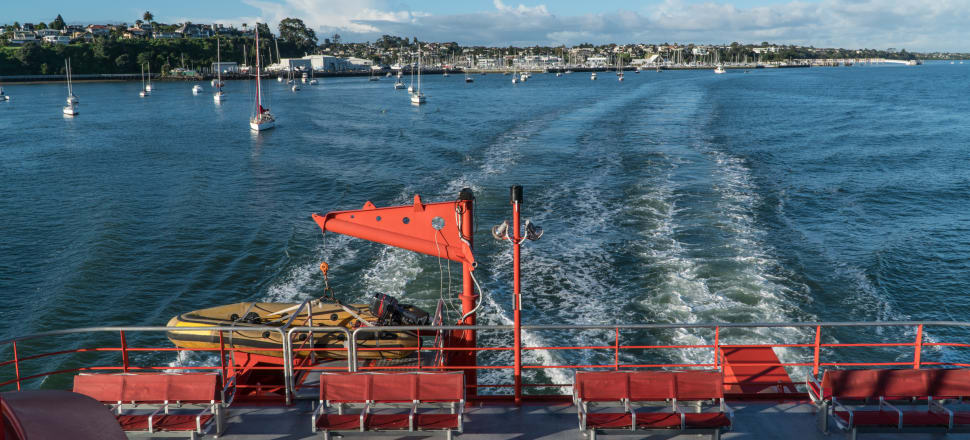
Successive governments have been slow to find solutions to rising ferry fares and missed subsidies, islanders complain
A Government attempt to bring ferry services to Waiheke under greater public control has failed, with Minister of Transport David Parker saying he needs a formal request by transport agency Waka Kotahi before it can happen.
Auckland Central MP Chlöe Swarbrick has been pressing successive Ministers to include the route under the Public Transport Operating Model, which would allow passengers to benefit from policies like half-price fares for under-25s.
The Waiheke ferry route is the only transport route in the country identified as integral to the public transport network but not included in the public transport framework.
READ MORE:
* Slow boat to ferry electrification
* Rotors over Waiheke, or Paradise drowned out
In June of last year, former Minister of Transport Michael Wood said he had begun the process of bringing the route into the framework, advising it would take around six months.
However, Parker has now banished hope of a quick solution for Waiheke constituents. In a reply to Swarbrick last week, he concedes the lack of resolution to date is “very frustrating”, but Waka Kotahi has been advised it needs to do further investigation into whether the route can continue its exemption from the model.
“I can only recommend the removal of an exemption by Order in Council if Waka Kotahi formally request this and I am satisfied the legislative requirements have been met,” he says.
Waiheke local board chair Cath Handley says there are “catastrophic social consequences” to the subsidies not being applied to the Waiheke route, and the government has left the islanders “marooned”.
She recently met with Waka Kotahi to enquire about much-desired changes to the ferry service, but didn’t harbour many hopes of the many requisite legislative boxes for the route to join the public transport framework being ticked anytime soon.
Devonport ferry routes joined the framework last year, after being excluded alongside the Waiheke route by former Minister of Transport Steven Joyce, a decade ago.
Cancelling that exemption has a very high legal bar – too high, Handley says. “That legislation introduced made the bar so high for a minister,” she says. “They have to tick a lot of prerequisites so meticulously… it’s a really inequitable piece of legislation.”
But although Handley accepts Parker’s letter stating he’s hamstrung by the need for Waka Kotahi to go through exhaustive tests before making the change, she also disputes his assessment of the current fare prices.
Parker lays out the costs of a regular commute across the gulf, saying multifare tickets haven’t recently increased in price. There’s also an Auckland Transport initiative to fund monthly passes from the coffers of local government.
But Handley argues there’s an inequity baked into this argument, as many residents can’t afford multi-passes.
“Loads of middle income earners cannot spend several hundred dollars at a whim for casual services,” she says. “It might be going to a specialist, or taking your child to a specialist, it could be any reason, you can’t always just fork out several hundred dollars.”
And with the election coming up quickly she worries the situation’s been put in the "too hard basket" by the current government.
"Nobody has really got the will and the guts to make a change, and while they are trying to cross the is and dot the ts, we are being ignored,” she says.
Other ‘outer harbour’ routes in Auckland’s ferry system are included in the model and thusly receive subsidies softening pain for regular users.
An adult causal fare with an AT HOP card from Half Moon Bay to the city centre is $8.25 one way, while a trip from Gulf Harbour is $11.60.
The same person would spend $29.50 getting to the city from Waiheke.
Meanwhile, children between five and 12 can travel for free on the two aforementioned routes when using an AT HOP card, but the same child coming from Waiheke would have to pay $13.
Swarbrick says the delay is "incredibly frustrating" and questions whether the letter needed to lay out the costs of a multi-voyage pass.
"The point around the cost of the ferries is a little bit of a slap in the face, especially given that a lot of locals are doing that maths on a daily basis," she said.
She says her constituents have been dealing with the ramifications of the route's exemption from the public transport framework for a decade, and it had finally felt like they were getting somewhere last year when Wood agreed to take a look.
But more than a year on and little has changed for Waiheke residents.
Swarbrick says Joyce had received advice at the time that the exemption would create an anomaly with consequences down the track.
"The situation we are left with is that we've just had inertia from the bureaucracy," she says. "While we've got closer than we've ever got, I am frustrated that requisite action had not been taken."








